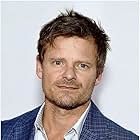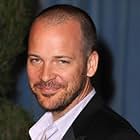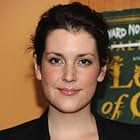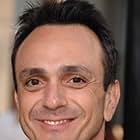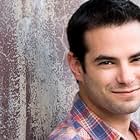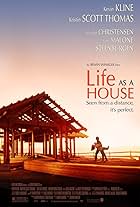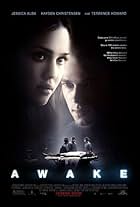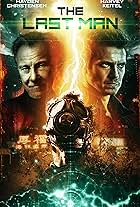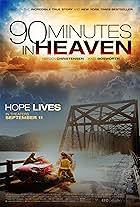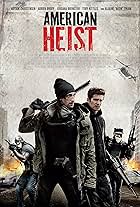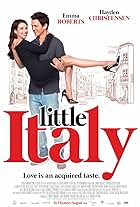The story of a young journalist who fell from grace when it was discovered he fabricated over half of his articles from the publication The New Republic magazine.The story of a young journalist who fell from grace when it was discovered he fabricated over half of his articles from the publication The New Republic magazine.The story of a young journalist who fell from grace when it was discovered he fabricated over half of his articles from the publication The New Republic magazine.
- Awards
- 11 wins & 28 nominations
Owen Roth
- Ian Restil
- (as Owen Rotharmel)
- Director
- Writers
- All cast & crew
- Production, box office & more at IMDbPro
Storyline
Did you know
- TriviaMany members of the test audience didn't believe the story was true. They thought no real-life magazine would have so many journalists in their early to mid 20s, even though the New Republic did. A place card added to the opening of the film stated that the median age of journalists working for the New Republic was 26.
- GoofsWhen Marty sits in on the editors' meeting, Caitlin is wearing a light blue sleeveless top. When the camera cuts back to the editors sitting down and checking the paper for "comma errors", she is wearing a dark blue button-up shirt with short sleeves.
- Quotes
Stephen Glass: [Outside the closed restaurant] I didn't do anything wrong, Chuck.
Chuck Lane: I really wish you'd stop saying that.
- Alternate versionsThere are three versions available, of different lengths. Runtimes are: "1h 34m (94 min)", the most available, theatrical cut, "1h 29m (89 min) (Australia)" and "1h 39m (99 min) (Toronto International) (Canada)" film festival original cut.
- SoundtracksWild Thing
Written by Chip Taylor
Performed by X
Used by permission of EMI Blackwood Music Inc.
Courtesy of Elektra Entertainment Group
By Arrangement with Warner Strategic Marketing
Featured review
As the subject line above says, I have to admit to an insider's point of view. I was an award-winning investigative reporter and editor working in newspapers, magazines, wire services, radio, and network-affiliate TV. I quit journalism in 1980 in large part because of the ever-increasing number of talent-challenged first-year "journalists" who wanted to be the next Woodward/Bernstein, and worse, the willingness of management (especially in local television news) to hire and even promote them. To be honest, however, I would have to add that the low pay, true even at places like The New Republic, was a major factor to an expectant father.
So I am sad to say that I completely buy the characterizations presented in this docudrama on Stephen Glass' time at that august magazine. The only thing that didn't ring true was that I never met anyone who had the time or inclination to be as considerate of his fellow journalists as Steve Glass apparently was. My wife pointed out that she never met one journalistic co-worker she would spend time with if she had the choice. I would admit that the nicest I knew were, at best, benign. I should add that I was NOT the nicest I knew. Even I didn't like me those days.
Getting back to the film, I can't speak to what actually motivated this particular person to fabricate 27 of 41 stories at a very major national magazine. The film suggests that he was too eager to please, and perhaps that is true. But that probably wasn't what motivated Jayson Blair (at the New York Times) or others who have recently been exposed as serial fabricators. Ambition unrestrained by ethics, unreasonable pressure to succeed due to premature promotions, other unknown and perhaps unknowable motivations... they probably figure into these sorts of disasters. But what is certainly true, and given very short shrift by the film, is the role journalistic management plays. To put a rather fine point to it, too many editors do not know how to, or perhaps just don't like to, do their jobs.
Too many times I see on national news programs statements treated as fact that somehow I can't believe were ever fact-checked. Just today I saw an episode of HBO's RealSports where an amazing statistic was mentioned: that a certain percentage (I believe about 4% but wasn't taking notes) of people who start playing poker as young kids go on to have gambling problems. I instantly asked myself: where did those statistics come from? Poker playing among the very young (pre-college-age) was probably a fairly rare thing before the past couple of years. How would they know today that 15 years ago such-and-such a percent would later have problems? If you understand statistics you would know that you can't find gambling addicts now, ask how many played poker as young kids, and extrapolate any useful estimate of future danger (100% of alcoholics once drank socially, but that doesn't mean 100% of social drinkers go on to become alcoholics). So did some editor at RealSports check this out? Why don't I believe someone did?
In writing this six-paragraph movie review, perhaps to be seen by no one, I checked things over time and again for accuracy. Oops: I misspelled Jayson Blair; fix it. Spelling errors no one cares about in this Internet-only story: check the entire piece in an external spell checker. In all I made almost two dozen changes. No one reading this will notice, or if they do, care. But that is what I do because I once was an editor.
It is this instinct for distrust of EVERYTHING anyone says or writes, including oneself and one's own work, that I believe is missing in far too many editors today. It is this shortcoming that allowed Stephen Glass, Jayson Blair et al to last so long before being exposed. It is a major weakness in journalism, and the lack of acknowledgement of this weakness is the only fault I found in this otherwise excellent film.
So I am sad to say that I completely buy the characterizations presented in this docudrama on Stephen Glass' time at that august magazine. The only thing that didn't ring true was that I never met anyone who had the time or inclination to be as considerate of his fellow journalists as Steve Glass apparently was. My wife pointed out that she never met one journalistic co-worker she would spend time with if she had the choice. I would admit that the nicest I knew were, at best, benign. I should add that I was NOT the nicest I knew. Even I didn't like me those days.
Getting back to the film, I can't speak to what actually motivated this particular person to fabricate 27 of 41 stories at a very major national magazine. The film suggests that he was too eager to please, and perhaps that is true. But that probably wasn't what motivated Jayson Blair (at the New York Times) or others who have recently been exposed as serial fabricators. Ambition unrestrained by ethics, unreasonable pressure to succeed due to premature promotions, other unknown and perhaps unknowable motivations... they probably figure into these sorts of disasters. But what is certainly true, and given very short shrift by the film, is the role journalistic management plays. To put a rather fine point to it, too many editors do not know how to, or perhaps just don't like to, do their jobs.
Too many times I see on national news programs statements treated as fact that somehow I can't believe were ever fact-checked. Just today I saw an episode of HBO's RealSports where an amazing statistic was mentioned: that a certain percentage (I believe about 4% but wasn't taking notes) of people who start playing poker as young kids go on to have gambling problems. I instantly asked myself: where did those statistics come from? Poker playing among the very young (pre-college-age) was probably a fairly rare thing before the past couple of years. How would they know today that 15 years ago such-and-such a percent would later have problems? If you understand statistics you would know that you can't find gambling addicts now, ask how many played poker as young kids, and extrapolate any useful estimate of future danger (100% of alcoholics once drank socially, but that doesn't mean 100% of social drinkers go on to become alcoholics). So did some editor at RealSports check this out? Why don't I believe someone did?
In writing this six-paragraph movie review, perhaps to be seen by no one, I checked things over time and again for accuracy. Oops: I misspelled Jayson Blair; fix it. Spelling errors no one cares about in this Internet-only story: check the entire piece in an external spell checker. In all I made almost two dozen changes. No one reading this will notice, or if they do, care. But that is what I do because I once was an editor.
It is this instinct for distrust of EVERYTHING anyone says or writes, including oneself and one's own work, that I believe is missing in far too many editors today. It is this shortcoming that allowed Stephen Glass, Jayson Blair et al to last so long before being exposed. It is a major weakness in journalism, and the lack of acknowledgement of this weakness is the only fault I found in this otherwise excellent film.
- isenberg-e
- May 30, 2005
- Permalink
Details
Box office
- Budget
- $6,000,000 (estimated)
- Gross US & Canada
- $2,220,008
- Opening weekend US & Canada
- $77,540
- Nov 2, 2003
- Gross worldwide
- $2,944,752
- Runtime1 hour 34 minutes
- Color
- Sound mix
- Aspect ratio
- 2.35 : 1
Contribute to this page
Suggest an edit or add missing content













